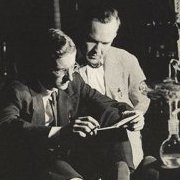-
Posts
4586 -
Joined
-
Last visited
-
Days Won
12
Content Type
Profiles
Forums
Events
Everything posted by hypervalent_iodine
-

Toxic properties of electron discovered
hypervalent_iodine replied to Theorist's topic in Speculations
Wrong. Each oxygen has 2 lone pairs of electrons in it. -
I'm moving this out of speculation because it really isn't speculative. 3D printers are very real. 3D printers exist and they're pretty neat. I have a friend who owns two of them. I think from memory the model he has is called the MakerBot. The newer version is the ThinkerBot. The best and most handy bit about them is that you can print the parts to build a new one or upgrade your old one. There is a file sharing community that allows to share blueprints to make various things, too, which saves on time if you can't be bothered figuring it out and programming it yourself.
-

How does salt effect the boiling point of water?
hypervalent_iodine replied to erinous's topic in Homework Help
Well in that case, feel free to tell was what you have written about and we can give you further suggestions. -

Toxic properties of electron discovered
hypervalent_iodine replied to Theorist's topic in Speculations
Every sugar, every strand of DNA, every protein, lipid, steroid, hormone... Also, I read a little of the paper. I loved this bit: That "something" is hydrogen cyanide. Also, as luck would have it, water should be pretty darn toxic by your reckoning. I suppose it is the lead cause of drowning, but I'm not sure what that has to do with it's electron configuration. All of them. -
Thread closed. Theorist, please don't open multiple threads on the one topic.
-

Toxic properties of electron discovered
hypervalent_iodine replied to Theorist's topic in Speculations
! Moderator Note 1. I'm moving this to speculations for the time being. 2. How about you link us this study and summarise it for us. -
Moontanman, a great post but I do have to add some minor corrections: *her *she
-
Except that it's not. ID is not science. It never has been and it never will be. We have already given you plenty of answers to your questions. The only person who really seems to have a problem with them is you, and yet you can give no valid, scientific reason for why our answers are unacceptable. You need to start by refuting our answers with science (and I remind you again that ID is not science); tell us why you think we are wrong in what we are saying and provide some evidence to counter our assertions. The 'green with envy' bit is quite obviously a joke. Science cares not for what you have or have not been told. I'm going to preface this next bit by saying that normally I don't advocate the abrupt, 'go read a damned book' responses unless they are absolutely needed. Your arguments are based entirely on misconceptions about a very widely accepted facet of science and a refusal to actually look at the evidence. Pro-tip: before you say you don't believe something or you think a scientific theory is absolute rubbish, you need to have a firm understanding of the theory itself and why it is accepted within the scientific community as being the best and most correct model for what we observe in nature. In other words, go read a damned book.
-
Well it took you 6 pages, but we got to the motivation behind your thread eventually. esbo, this is a mainstream science forum. If you have issues with the arguments presented to you pertaining to the topic of the thread, you argue them with science, not baseless speculation. If you have a problem with evolution, you start a new topic in the Speculations forum.
-
I don't know that there is an exact answer to that. What we do know is that they evolved that way and they seem to work just fine. You could possibly view it as analogous to localised energy minima. In protein folding, as well folding of small molecular compounds and probably a lot of other things, a protein chain doesn't necessarily adopt the structural confirmation that is the most stable. If we consider the following image: Image from here. The bottom of this plot represents the lowest energy state - i.e. the state in which a protein is the most stable. Starting from the highest energy state - the unfolded protein - getting to that end point through protein folding means that the protein will often fall into energy traps (the dips in the plot). These traps aren't the lowest energy conformation, but often the energy barrier to move out of the trap is so high that it simply stays where it is. You end up with a structure that might not be the most stable, but one that is stable enough. You could extrapolate this model to the evolution of plant pigments. Let's say that the highest level of fitness of a plant is represented by the tip of the above plot and further assume that the ultimate fitness of a plant is one that is black and is able to dispose of excess heat easily. Higher plants inherited chlorophyll from aquatic ancestors. Moving from that to a black pigment would necessitate the evolution of not only a new pigment, but an efficient mechanism to get rid of all the excess heat. Looking at the explanation I gave regarding protein folding, we could say that, yes, perhaps a plant that absorbs red and blue light is not the most ideal, but perhaps it is simply good enough. I think it's also worth going back to the fact that chlorophyll didn't originate on land and that light penetration of water provides conditions different to those out of the water - i.e. selection pressures would have been different.
-
You're starting to sound very much like a troll. The question you asked was 'why are plants green?' followed by, 'surely black would be better?'. The answer is, because they evolved that way. Because most plants live in habitats that have variable light conditions and as such they need to have a pigment that optimises energy harvesting when there is not much light, but protects the plant when there is too much. Under the highly variable light conditions I mentioned before, green-reflecting pigments are well suited to both of these functions, where as a pigment that absorbs the full visible spectrum would result in a dead plant. You are misrepresenting what I said entirely. My quote was this:
-

Tornado Earthquake... Link to Solar System
hypervalent_iodine replied to dade arinto's topic in Speculations
! Moderator Note Moved to speculations. -

Where is the boundary?
hypervalent_iodine replied to iNow's topic in Suggestions, Comments and Support
Perhaps I should have said comments. Regardless, other members and their interaction with others is not the point of this thread. -

Where is the boundary?
hypervalent_iodine replied to iNow's topic in Suggestions, Comments and Support
This is not a place for personal attacks. Not in this thread or any other thread. If you have a problem with something someone has said, you use the report feature. I've edited this to remove the mod tags as I realised post-fact that I have participated in this thread and shouldn't be moderating it. The point remains, though. -
Can I ask if these images are sketches of your device: Edited as per request.
-

Playing with YouTube embedding
hypervalent_iodine replied to hypervalent_iodine's topic in The Sandbox
Me neither. You could always ask the Cap'n if you needed to. -
http://www.youtube.c...h?v=n9KaI5T0zRw Hooray! Now to see if I can get the two in the one post. http://www.youtube.com/watch?v=n9KaI5T0zRw Seems that two in the one post broke it.
-

What are you listening to right now?
hypervalent_iodine replied to heathenwilliamduke's topic in The Lounge
http://www.youtube.c...h?v=n9KaI5T0zRw Oh hey, look at me go. The problem was the link. All I did was delete the 'feature=player_detailpage&' and it worked. Edit: I swear that was working 5 edits ago. I propose we move this to the sand box. Joatmon: http://www.scienceforums.net/topic/64993-playing-with-youtube-embedding/page__gopid__664584#entry664584 -

What are you listening to right now?
hypervalent_iodine replied to heathenwilliamduke's topic in The Lounge
I think all you have to do it paste the link as is, minus the tags. Works for me, anyway. http://www.youtube.com/watch?feature=player_detailpage&v=n9KaI5T0zRw -
nelson1990911, you're going to have to do the bulk of the work yourself here. AJS has already given you a wealth of information; it's your turn now.
-
You would have to purchase the paper if you don't have access to it yourself. And yes, it is *possible* to distil it, but it's not easy to do. I'm going to ask again why you need so much of it?
-
! Moderator Note markcgreer, one thread on this is quite enough. Moved to speculations and closed.
-
! Moderator Note guitaoist, A few things. a.) Text talk is both obnoxious and gives the impression that your words do not hold much academic merit. Start writing complete words and please, the apostrophe on your keyboard is lonely. Start making friends with him. b.) You are preaching and giving off a very trollish odor. Respond to the questions raised in this thread with words; preferably words that contain some actual evidence. If you think you have already recorded a sufficient response to some of the points, give a small synopsis rather than, 'omg, how do u not know this?!' followed by yet another video. This is not a place to advertise and soapbox your YouTube channel. This is a science forum and we expect you to hold to a certain standard in your posts (it's in our rules; you should read them). Too long and didn't read? The short version is this: use proper English, stop preaching and start responding to the questions you are being asked or this thread will be closed.
-
! Moderator Note ydoaPs and DrRocket, You both need to start showing a little bit more maturity here. If you don't have anything constructive and polite to say, then don't say anything.
-
You can't refute everything told to you by saying that you simply don't like the arguments presented. That's disingenuous. Try arguing with science instead of 'I don't like it'. Have a read of this paper: http://onlinelibrary...0563.x/abstract An important part I would like to draw your attention to is found in the abstract, which states that chlorophyll pigments act to maximise energy harvesting during low light (undersaturation) conditions as well serving a protective function in over-saturation conditions. That last part is key within the context of this thread. Too much light is not a good thing and is in fact harmful to a plant, as they would have to dissipate a lot more excess energy as heat. From that argument alone you should be able to see why using pigments that absorb all the entire spectrum is not a good thing. As such, higher order plants have developed pigments that are adapted to highly variable light conditions. So yes, 'evolution', happens to be a shortened but no less correct version of the answer. As an aside, evolution of pigments is actually a pretty interesting thing and can tell you a lot about the development of the Earth's atmosphere. If you're really that interested in it, you should read that paper and do a search on it in Google.

